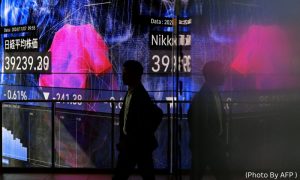PARIS: The recent addition of the United Arab Emirates, Egypt, Ethiopia, and Iran to BRICS marks a significant transformation of the group from an economic alliance of emerging markets to a broad platform for the Global South, promoting economic diversity and reducing dependency on dollar-based financial systems, experts said.
This expanded group, called “BRICS-plus,” now represents nearly half of the world’s population and over a third of its GDP in purchasing power parity, reflecting its growing importance on the global stage.
At the 16th BRICS Summit held last week in Kazan, the group’s founding members—Brazil, Russia, India, China, and South Africa—welcomed new members that underscore BRICS’ commitment to a multipolar world order.
Formed initially in 2009 as a forum for economic collaboration among the largest emerging markets, BRICS has evolved, positioning itself as a voice for nations seeking alternatives to the West-led economic models. With a diverse membership from Latin America, Asia, Africa, and now the Middle East, the expanded BRICS aims to foster trade and investment through economic collaboration rather than ideological alignment, experts remarked.
The group’s leaders emphasized that BRICS is not an anti-West coalition but a “non-West” platform. Days ahead of the summit, Russian President Vladimir Putin said that BRICS is simply non-Western, adding that the group’s mission is to support inclusive economic opportunities. South Africa, which hosted the previous BRICS summit, clarified that BRICS is an inclusive forum, open to nations with various political alignments, with no intention of undermining other international bodies.
READ ALSO: Iran Guards Head Warns Israel of ‘Bitter Consequences’ Following Strike: Media
The expansion of BRICS in 2023 is the first enlargement since South Africa joined in 2010 and includes nations that bring substantial geopolitical and economic weight to the table.
BRICS countries are now exploring local currency trade, providing a practical framework for nations facing Western sanctions to maintain economic growth. The UAE recently completed its first liquefied natural gas trade in yuan with China. Experts note that while such transactions might signal a shift away from the US dollar, the underlying aim is to streamline trade and reduce currency conversion costs.
With an inclusive, pragmatic approach, BRICS-plus leaders have begun discussing a possible common currency among its members, a move that could further reduce reliance on the dollar. This potential shift is part of the group’s broader strategy to build resilient economic frameworks for its members and others within the Global South.
The BRICS expansion serves as a reminder that the global landscape is shifting toward multilateral approaches. For the United States, analysts suggest that BRICS’ momentum could provide a reason to reconsider the exclusive nature of the G7, a group of wealthy democracies whose economies have slowed in recent years.

























